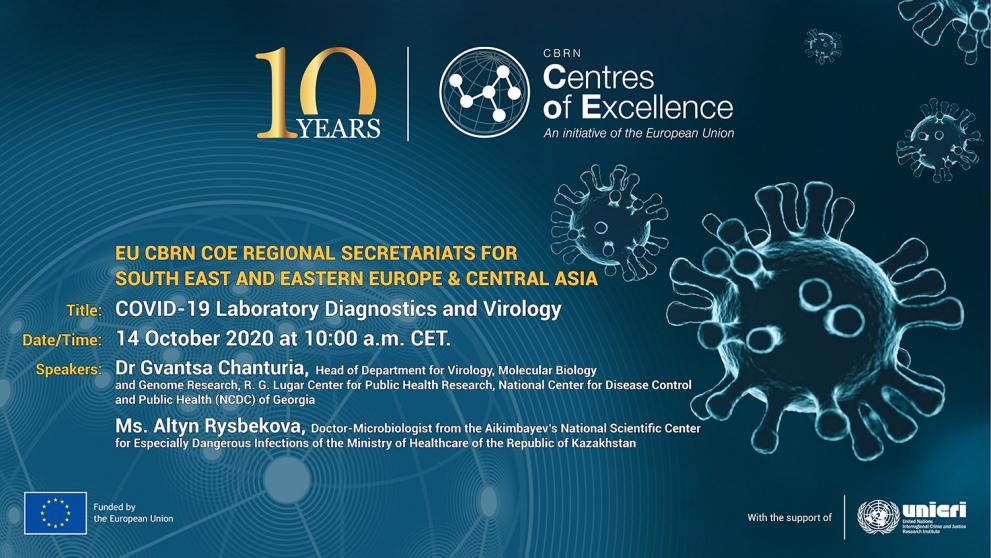
Within the framework of the EU CBRN Centres of Excellence Initiative, the Regional Secretariat for Central Asia (CA) and the Regional Secretariat for South East & Eastern Europe (SEEE) have conducted their third Interregional Webinar dedicated to “COVID-19 Laboratory Diagnostics and Virology” on 14 October 2020.
The webinar was opened by Mr. Bakhtiyor Gulyamov, the Head of the Regional Secretariat for Central Asia and Dr. Hendrik Visser, the Project Manager for the EU CBRN CoE Project 53 on “Strengthening the national legal framework and provision of specialized training on bio-safety and bio-security in Central Asian countries”. Both of them stressed the importance of the COVID-19 inter-regional webinars and highly appreciated contribution of the EU CBRN CoE Initiative to raising awareness of the local specialists on the laboratory diagnostics to identify SARS-CoV-2 and other matters related to virology.
Two eminent experts Dr. Gvantsa Chanturia, Head of Department for Virology, Molecular Biology and Genome Research, R. G. Lugar Center for Public Health Research, National Center for Disease Control and Public Health (NCDC) of Georgia and Ms. Altyn Rysbekova, Physician – Microbiologist at the Aikimbayev’s National Scientific Center for Especially Dangerous Infections of the Ministry of Healthcare of the Republic of Kazakhstan were invited to the webinar to speak about the COVID-19 diagnostics and virology.
During the webinar, overall information on the number of the COVID-19 cases and case fatality rate in Georgia and Kazakhstan was presented.
The experts also provided information on:
- diagnostics and test systems used to detect COVID-19;
- organizations and institutions involved in research on COVID-19;
- COVID-19 diagnostics in BSL-3 conditions;
- initial problems with diagnostics of COVID-19 and steps taken in Kazakhstan to address them;
- joint actions by WHO and the Government of Kazakhstan in the context of COVID-19 pandemics.
The participants also acquired precious knowledge and understandings on the virology of COVID-19, i.e. its appearance, genome sequencing as done in Georgia, phylogenic analysis and studies on virus transmission.
Remarkably, it is the third webinar, where women-scientists from both of the regions – CA and SEEE – share knowledge and expertise related to the COVID-19 pandemic. This anecdotal evidence suggests the important roles that women scientists play to broaden knowledge in diagnostic medicine and COVID-19 testing as well as in global science.
Around 40 participants took part in the webinar, including National Focal Points of CA and SEEE regions, CBRN national experts, representatives of the relevant ministries and agencies as well as representatives of the European Commission and the United Nations Interregional Crime and Justice Research Institute (UNICRI). The webinar was applauded as an enriching opportunity to learn from the experts’ experiences, to tighten bonds between the scientists of the CoE network in the CA and SEEE regions in order to better calibrate response efforts on the national, regional and inter-regional levels.
The next inter-regional webinar to further cover different aspects of COVID-19 Laboratory Diagnostics and Virology is scheduled for November. The inter-regional webinars are conducted by means of Zoom video-conferencing platform with simultaneous English-Russian interpretation provided with support of the EU CBRN CoE Project 53.
Details
- Publication date
- 15 October 2020
- Authors
- Joint Research Centre | Directorate-General for International Cooperation and Development
- Location
- Brussels
- CoE Region
- CA - Central Asia
- SEEE - South East and Eastern Europe
